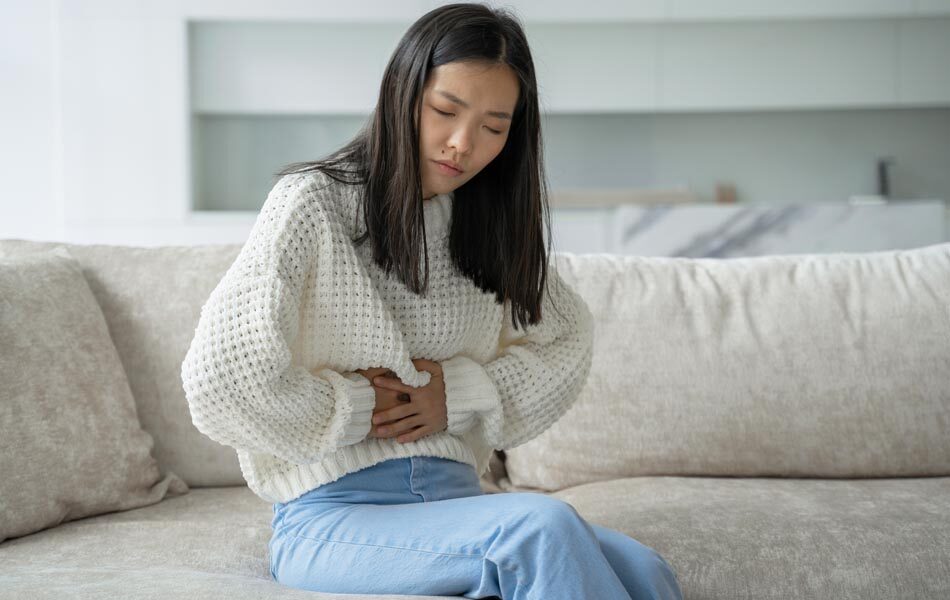Period Bloating: 6 Ways to Get Rid of It
Period bloating is a common symptom of PMS. Is it possible to relieve it?

Periods can be both unpleasant and exhausting. Having a period for 4–5 days a month can be overwhelming. Apart from bleeding, you may experience other various symptoms during your periods.
Bloating is a common period symptom that you may experience. It can happen before or during your period, making your stomach feel tight and swollen.
This can also harm your self-esteem because you may think you have gained weight due to your period, which you do not want to deal with. It can also make you feel uncomfortable, even in your favorite jeans, a week or two before your period.
Knowing what causes bloating before or during periods can help you make simple lifestyle changes to reduce its incidence and severity.
Period Bloating: What Is It?
Period bloating is the feeling of fullness, tightness, or pressure in your abdomen before or during your period. It occurs when your uterus and ovaries are still producing hormones that cause an increase in blood flow to the abdominal area.
Premenstrual syndrome (PMS) affects up to 85% of women. Period bloating is one of the PMS symptoms and frequently brings other unfavorable side effects.
It can cause psychological and physical symptoms, including lower self-confidence, mood fluctuations, a decreased sense of well-being, stomach cramps, headaches, food cravings, swollen breasts, and backaches. You can also gain a few pounds.
Period bloating can also cause chronic pain and may feel hard to the touch. You may also pass wind more often, burp, or feel your belly gurgle. Some women may be affected by this, and it may make them avoid social situations, while others may not be affected.
While some women may experience minor period bloating, others experience more severe symptoms such as diarrhea or constipation, cramping, and back pain. If this happens to you, you should speak with your doctor about it so they can offer possible solutions.
How Long Does Period Bloating Last?
Period bloating appears 1–2 weeks or a couple of days before your period and can last anywhere from 5 to 10 days. This is because everyone is different, depending on how their progesterone and estrogen hormone levels rise and fall.
Period bloating should stop during your period or after a few days. This is because the first day of your period is thought to be the day when your hormones start to revert to their normal levels.
Why Do I Get Bloated on My Period?
Period bloating occurs due to the fall of sex hormones – progesterone and estrogen – which happens about one week before your period. Low progesterone levels cause the uterus to shed its lining, causing menstrual bleeding. The levels of progesterone and estrogen in your body greatly affect how you feel and how your body functions.
Besides menstrual bleeding, research suggests that low progesterone and estrogen levels also cause water and salt retention in the body. This means that body cells are swollen with water, resulting in bloating.
According to a study, most women experience increased levels of period bloating on the first day of their period.
How to Get Rid of Period Bloating? 6 Tips to Try Today
There are several ways you can reduce period bloating and get rid of it permanently. If you follow these 6 tips, you will be able to keep your belly flat and feel comfortable every month.
#1 Consume less sodium
One of the most common causes of period bloating is consuming too much sodium. The average American consumes between 3,400–3,600mg of sodium daily, which is more than the recommended amount. Recommended daily salt intake is no more than 2,300mg.
A person’s body can retain more water from sodium in salt. Avoiding salty meals may help reduce water retention and improve period bloating.
High-sodium foods include canned or packaged soups, cottage cheese, shrimp, ham, etc. Processed foods also have a lot of salt and other ingredients that may be harmful to you.
Instead, eat foods high in fiber, such as whole grains, fresh fruits and vegetables, and other nutritious foods, such as nuts, seeds, and lean protein. Check labels to ensure you pick foods that specifically state they’re low in sodium.
#2 Avoid junk food and sugary drinks
Junk food and anything that has been fried can take a long time to break down in your stomach, causing bloating. Sugary drinks and refined carbohydrates can cause an increase in blood sugar levels. This raises blood insulin levels, which leads the kidneys to retain more salt.
Higher salt levels may result in more water retention. If you want to minimize bloating and water retention during your period, it is best to avoid junk food and sugary drinks.
#3 Stay hydrated
Staying hydrated makes you feel a lot better and enhances kidney function. Ensure to consume plenty of water in the days preceding your period. If you’re drinking caffeinated drinks and sodas, you’re probably dehydrated, which can lead to bloating.
Water consumption can help relieve period bloating. Aim for a minimum of eight 8-ounce glasses of water per day.
#4 Try exercising
Exercising can help the extra fluid in your body move around and relieve pain. A 2013 study discovered that regular exercise might help reduce PMS symptoms. While period bloating is among the PMS symptoms, exercising regularly may help to reduce it.
You should aim to exercise at least 60 minutes per day to stay healthy. Research suggests that low-impact exercises like yoga and pilates can significantly improve your overall health and well-being before, during, and after your period.
Diaphragmatic breathing is a major emphasis in these two types of exercise. Deep breathing encourages calmness, improves focus, lifts the mood, and enables pelvic, belly, and rib cage stretching.
Yoga and pilates can lessen your discomfort because many positions that relieve menstrual cramps are also effective for bloating. Yoga is also good for constipation. Put your attention on movements that will activate or stimulate your digestive system.
Exercising can also help with digestion issues and weight loss, which can help reduce bloating and prevent future problems with your digestive system.
#5 Try a fiber supplement
The PMS symptom, bloating, may also be relieved by a fiber supplement that is designed to help reduce constipation and bloating.
The main ingredient in these products is dietary fiber, which helps alleviate bloating, constipation, and flatulence by forming a gel-like substance that absorbs water into the digestive tract.
#6 Consult with your doctor if nothing helps
Bloating during a woman’s menstrual cycle is typically uncomfortable, but it does not prevent her from going about her day. However, if period bloating affects your everyday activities, it is a good idea to talk to your doctor.
If your PMS symptoms, such as bloating, don’t go away after your menstrual cycle, it’s an indicator of a more serious medical condition, and further testing may be necessary.
Your doctor may recommend a symptom diary. This will enable you to monitor your bloating and provide your doctor with vital information for deciding the best course of action.
Why Is My Stomach Still Bloated After My Periods?
Bloating after periods may be a symptom of an underlying condition such as endometriosis or an ovarian cyst. Endometriosis happens when the lining of the uterus develops on the outside. This may result in excruciating cramps before, during, and following your period.
Endometriosis can result in uncomfortable and frequently severe abdominal bloating. This bloating may be caused by growth, inflammation, or other digestive problems resulting from endometriosis.
If you experience post-period bloating, it’s essential to maintain a healthy lifestyle. This includes a balanced diet, regular exercise, and stress-reduction measures. Always discuss any treatment plan you want to start with your doctor. Additionally, you might talk about the symptoms you want to treat.
A Word From MD
You know how uncomfortable it can be if you regularly experience bloating and other premenstrual syndrome symptoms. However, you don’t have to live with these symptoms just because it is so prevalent.
Dietary changes may help improve period bloating and other PMS symptoms. Instead of three huge meals, consider eating six smaller ones. By doing so, you might be able to lessen bloating and maintain steady blood sugar levels all day long.
You can also choose potassium-rich and fiber-rich foods such as fruits, vegetables, and whole grains to reduce bloating, constipation, and any other PMS symptoms. Complex carbs like brown rice and whole-grain bread are also important as they’ll provide your body with enough energy and fiber all day.
Avoid processed, sugary, fatty, and salty foods. Caffeine and alcohol are also not good before and during your period.
Conclusion
Period bloating might happen either before or during your period. It’s thought to be caused by the monthly hormonal changes that occur throughout your period. It results in a swollen and tight belly and an uncomfortable feeling.
Exercising regularly, drinking more water, and avoiding junk and sugary drinks are all ways that can help reduce bloating and any other premenstrual syndrome symptoms.

















































 Select your language:
Select your language: 








